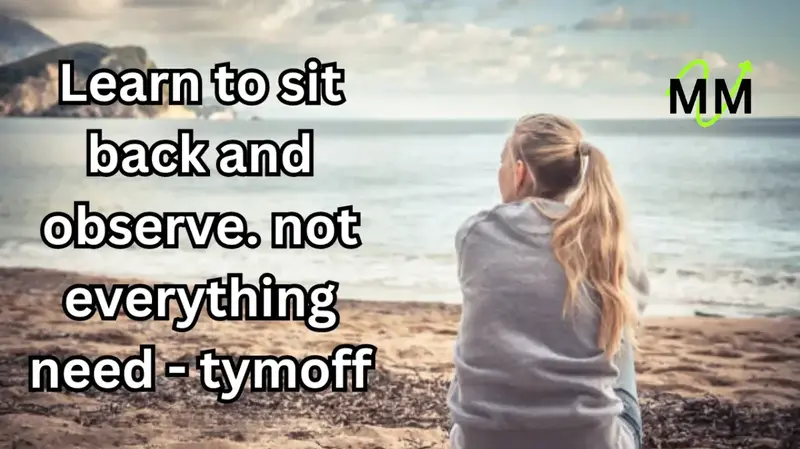Introduction: The Art of Sitting Back and Observing
In today’s fast-paced world, we often feel pressured to respond immediately to every situation. Social media, emails, and constant notifications demand our attention, leading to stress and burnout. However, there’s great power in learning to sit back and observe. Not everything needs a reaction, as the art of observation can offer clarity and insight. This concept, promoted by Learn to sit back and observe. not everything need – Tymoff, teaches us the value of pausing before reacting.
Understanding the Concept: Sit Back and Observe
To truly embrace the philosophy of Learn to sit back and observe. not everything need – Tymoff we must first understand what it means to sit back and observe. It’s about taking a moment to detach from the chaos, step back, and watch events unfold. Instead of rushing to conclusions or reacting emotionally, you take a step back and let things naturally evolve. This mindset can bring a sense of peace and clarity, helping you make more thoughtful decisions.
The Power of Observation
Observing situations without jumping in immediately can be incredibly empowering. It gives you a chance to gather more information before forming an opinion. When you learn to sit back and observe, you allow your mind to process things at a deeper level. You avoid knee-jerk reactions that might cloud your judgment. By watching the world around you, you gain a clearer understanding of what’s truly important.
Why Not Everything Needs a Reaction
We often feel the urge to respond to everything, whether it’s a text, a comment, or an argument. However, not everything needs a reaction. Taking a step back helps you assess the situation from a neutral standpoint. Reacting impulsively can lead to unnecessary conflict or misunderstandings. By practicing the art of observation, you give yourself the time and space to reflect before responding.
Benefits of Sitting Back and Observing
- Improved Decision-Making: When you observe before reacting, you make decisions with a clear mind.
- Less Stress: Reacting less reduces mental and emotional strain, promoting peace.
- Enhanced Relationships: Observing allows for better understanding, avoiding hasty judgments.
- Emotional Control: By taking a step back, you maintain control over your emotions.
- Mindfulness: Observing helps you stay present and engaged in the moment.
How to Practice Sitting Back and Observing
- Pause Before Reacting: When something triggers you, take a deep breath and give yourself time to process.
- Observe, Don’t Judge: Watch events unfold without jumping to conclusions. Focus on what is happening, not on how you feel about it.
- Practice Patience: Not every situation requires an immediate response. Give yourself the freedom to wait and watch.
- Be Mindful: Pay attention to your surroundings. Take in the details, whether it’s a conversation or an event.
- Reflect Before Responding: After observing, reflect on the situation and decide the best course of action.
Applying the Practice in Daily Life
Learning to sit back and observe can be challenging at first, especially in our busy, reaction-driven world. However, with practice, it can become second nature. Whether at work, in relationships, or in social settings, observing before reacting can bring significant improvements. For example, in a heated conversation, you can choose to listen attentively, process what is being said, and then respond thoughtfully.
Tymoff’s Approach to Personal Growth
Learn to sit back and observe. not everything need – Tymoff advocates for personal growth through mindfulness and introspection. By focusing on observation rather than reaction, we can develop a deeper understanding of ourselves and others. This approach encourages emotional intelligence and self-awareness, allowing us to navigate life’s challenges with grace. Over time, you will notice improvements in both your personal and professional life.
The Role of Observation in Emotional Intelligence
Emotional intelligence is the ability to recognize and manage your emotions while understanding the emotions of others. Sitting back and observing plays a significant role in developing emotional intelligence. By pausing and reflecting before reacting, you can better regulate your emotions and respond in a way that is appropriate for the situation. This leads to healthier relationships and greater empathy for others.
How Sitting Back Can Improve Mental Health
Taking the time to observe without reacting also has profound benefits for mental health. Constantly reacting to stressors can lead to anxiety and burnout. By learning to sit back and observe, you can reduce the emotional toll of these stressors. This practice allows you to create mental space and respond to challenges more effectively. In turn, it fosters greater emotional resilience and a more balanced outlook on life.
Not Everything Needs a Response: Letting Go of the Urge to React
In a world that constantly pushes us to engage, it’s crucial to recognize that not every situation demands a response. Whether it’s a comment on social media, an argument, or a personal critique, you don’t always need to react immediately. Sometimes, the best course of action is to observe, reflect, and choose silence. This doesn’t mean avoiding responsibility or being passive; it means being mindful of when it’s necessary to engage and when it’s better to stay silent.
Conclusion: Embrace the Power of Observation
By learning to sit back and observe, we empower ourselves to respond thoughtfully rather than react impulsively. This practice can significantly improve our decision-making, emotional intelligence, and mental health. As you continue to embrace this approach, remember that not everything needs a reaction. With the philosophy of Learn to sit back and observe. not everything need – Tymoff you can navigate life with more clarity and less stress. Take a step back, observe, and watch as your life transforms for the better. Contact us for more details visit our site.
